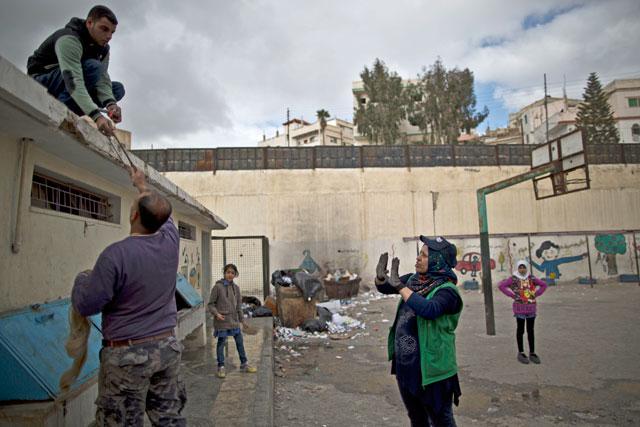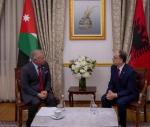You are here
With every turn of a wrench, Jordanian woman breaks barriers
By AP - Oct 27,2016 - Last updated at Oct 27,2016

In this March 21 photo, plumber Maryam Mutlaq, 41, works at a school in Zarqa, 22km northeast of Amman (AP photo by Muhammed Muheisen)
ZARQA — It is graduation day, and Maryam Mutlaq is celebrating her transformation from stay-at-home mom to licensed plumber.
The training took 18 months. Now, Mutlaq and her 29 course mates take turns presenting a business plan at the March ceremony.
Mutlaq, 41, speaks with a clear, strong voice and stands out for her detailed vision. She will open a storefront plumbing business, she tells the other women.
From there she plans to sell pipes and other spare parts, and book house calls. She has even picked out a name, Challenge, and a location in an up-and-coming neighbourhood in this northeastern city of more than 1 million people.
It has been a challenge just to come this far in a relatively conservative community where many women don’t work outside the home at all.
Even Mutlaq’s children, who cheer her on from the audience today, fiercely opposed her choice at first. The coming months will determine if she can overcome the odds and turn her bold dream into a real-life business.
For now, in the afterglow of the graduation, she is brimming with optimism.
“We will break down the barriers that have been put up, that say we aren’t capable of doing things as women,” she says. “There is also a barrier of fear within us that has to be broken.”
Mutlaq’s choice of career is rare for the Arab world, where traditional gender roles make men the main breadwinners and confine most women to certain jobs — teachers, nurses, low-level government clerks.
Five years ago, the Arab Spring brought the hope of more opportunities for women. Yet that promise has not panned out, analysts and activists say, and in some cases spreading violence has even led to a backlash.
The Arab region scores lowest in the world in the percentage of women who work outside the home — half the global average of about 50 per cent. Jordan in turn scores far below the regional average for female labour force participation, with just over 14 per cent.
If Mutlaq succeeds, she will join several dozen licensed women plumbers in the nation. But Zarqa, 22km northeast of Amman, could be one of toughest places in Jordan for women trying to tear down barriers.
This gritty industrial city has absorbed waves of war refugees over the decades, first Palestinians, then Iraqis, then about 150,000 Syrians.
Each influx of desperate newcomers has kept unemployment high, now at more than 24 per cent, or double the nation’s official average.
“Society is very conservative and is getting more and more conservative due to the general situation in the country and the region,” says Zarqa Mayor Imad Momani. “We are far from seeing women in non-traditional jobs like plumbers or truck drivers.”
Mutlaq got involved in 2014 in the plumbers’ project, funded by the Millennium Challenge Corporation, a US government aid agency, to improve water delivery in Zarqa by preventing leakage. Jordan is one of the world’s driest countries.
The project takes into account a traditional consideration: It would be easier for female plumbers to conduct home visits. Under strict rules of gender separation, a male plumber would not be allowed to enter when a housewife is home alone, without a male relative as chaperone.
Recruitment was difficult, and Mutlaq was initially sceptical. But her husband Samir, who works in a flower shop, thought it was worth a try.
He wanted her to have a life outside the family as the children were growing up. The family, struggling from month to month, could also use a second income.
Her four children did not feel the same way. Sami, 19, feared that the neighbours would gossip. Lara, 12, was so embarrassed that she begged her mother to take off her green plumber’s work vest during a parent-teacher meeting at school. Mutlaq kept it on to show her daughter that she is proud of herself.
Mutlaq discovered during training that she loved handling tools and fixing things. Even when she was off the clock, she started carrying a few tools in her gray purse, in case a neighbour or relative needed a bit of plumbing “first aid.”
After a few months, she was assigned to a contractor and began going out on house calls as an assistant. She taught housewives to fix leaking pipes and clean water tanks on a regular basis. And she saw herself as a role model, especially for her daughters.
Her advice? “I always tell them a woman must challenge herself, but not exceed the red lines of society,” she says.
By graduation day in March, Mutlaq’s children have come around. Sami is glad his mother can contribute to the family finances. Fatmeh, 22, even joins the community outreach programme for a few months.
After the ceremony, Mutlaq’s family helps her carry to the car the day’s biggest prize — a 40-piece professional plumbers’ tool kit for each graduate.
They drive to their small home on a dusty, potholed side street of Zarqa, where Lara excitedly unpacks the kit in the living room. She lays a drill, work gloves and wrenches on the floor.
Two weeks later, the kit takes pride of place on a table in the living room. This morning, Mutlaq is getting ready for work.
She tidies the kitchen, washes dishes and boils a small cup of strong Turkish coffee. Then she puts on her work clothes, pulling a baseball cap over her headscarf and the green vest over a loose, long-sleeved T-shirt and pants.
The day’s assignment involves replacing faucets and installing water tanks in several schools. The first stop is Lara’s school, which is run-down and overcrowded, with a shift for girls in the morning and boys in the afternoon.
Mutlaq works with a male plumber, Ibrahim Asmar. They head to the girls’ toilets. Mutlaq takes charge, telling Asmar which part of the assignment she intends to do, and begins removing an old faucet above a sink.
Asmar praises her performance. He explains she is doing well on everything that does not require heavy lifting, such as hoisting water tanks onto rooftops. She can do 70 per cent of the tasks expected of a plumber, he says.
Lara is eager to see her mother at the school in full work gear, embracing her in the hallway during break. She says she now likes everything about her mother’s job, but especially the tools. She wants to work in Mutlaq’s shop and take a salary.
But Mutlaq still faces plenty of criticism. Her oldest brother is a hold-out, telling his sister at family gatherings that she should not be a plumber. There is also opposition in her neighbourhood.
However, economists say women like Mutlaq could be a life-saver for Jordan, which is buckling under the fallout from conflicts in neighbouring Iraq and Syria.
The International Labour Organisation calculates that Jordan’s economy could grow by 5 per cent, or almost $2 billion, if job opportunities were distributed more evenly between women and men.
It’s the end of March. Today Mutlaq is talking to teachers and students about saving water and cleaning tanks. The project that gave her steady employment is winding down, and she is starting to worry about the future.
She has pinned all her hopes on getting a grant, calculating she will need at least JD4,000 to open her storefront plumbing business. “I’m scared that I will end up sitting at home,” she says.
Mutlaq believes going into business is her only option, because contractors will prefer male plumbers and not hire her.
Small jobs for relatives and neighbours do not pay off. She cannot charge much in her low-income neighbourhood and is expected to give discounts to relatives. She has to take taxis to assignments, further cutting into profits, because she does not drive.
Back home, Mutlaq flips through her work book — a white notepad listing her recent jobs — to underscore the point. She has charged between JD5 and JD10 per home visit, barely worth her time.
Such struggles are familiar to 53-year-old Khawla Sheikh, one of Jordan’s first female plumbers. In 2004, with her children grown, Sheikh signed up for a US-funded plumbing course. She earned her licence and gained work experience by tagging along with male plumbers employed by her husband.
“So many people did not support me,” she says. “The only ones were my husband and my family.”
Since then, she has been teaching plumbing courses for women, along with working as a plumber. Sheikh formed a cooperative of 18 female plumbers last year to help women with difficulties like launching their own business with no car or start-up funds. The women go on house calls in pairs, for safety, with Sheikh often driving and acting as mentor.
Women in the region who want to work are often deterred by lack of child care, low salaries and a gender pay gap of 28 per cent in healthcare and close to 25 per cent in education.
In late May, Mutlaq is invited to a meeting for members of her plumber course, hosted by an international aid group. She is anxious. She calls Samira Smirat, her mentor in the programme, almost daily to find out if she will receive a grant.
At the meeting, 12 women are handed cheques of JD300 each. Mutlaq and the rest get nothing.
Two days later, speaking in her living room, Mutlaq looks both angry and dejected. Smirat is also shocked, because she expected Mutlaq to be among the top candidates for a grant.
“It was a big dream, but it’s been destroyed,” Mutlaq says.
She thinks of giving up plumbing and even selling her tool kit. Her husband is also bitter.
She spends a month at home, but by early July, she has bounced back. She applies for a grant from USAID, and expects to hear back by the fall.
In the meantime, she is renting out some of her tools, doing small plumbing jobs and going on assignments with one of her brothers, also a plumber. He is proud of his sister.
Mutlaq says she hopes to encourage other women to get out of the house and break what she calls the culture of shame. Even though her business is not yet open, she says her journey so far has already been worthwhile.
“This was the chance of a lifetime,” she says. “The way I look at life has changed. The way I look at myself has changed, too.”
Related Articles
AMMAN — A tap problem in her house prompted Thekrayat Abu Al Qasem to learn the basics of plumbing and depend on herself to troubleshoot any
AMMAN — More than 977,534 women have started their own business since the launch of the Micro-fund for Women (MFW) in 1996, with a total of
AMMAN — A misunderstanding that turned into an opportunity led an Irbid woman to establish a training academy for women plumbers, filling a



















